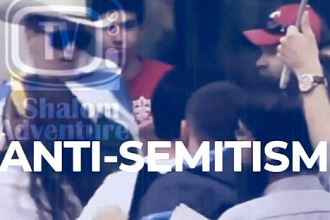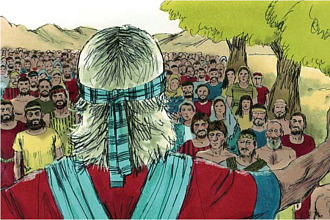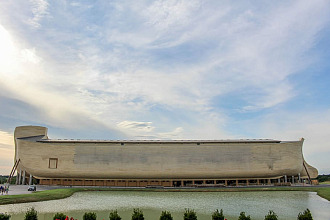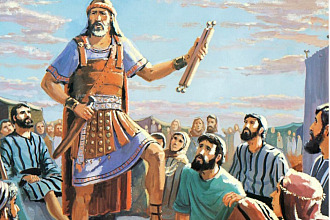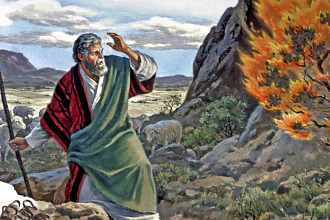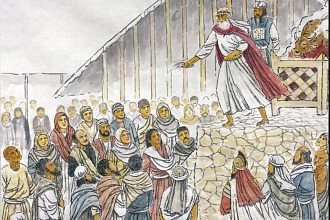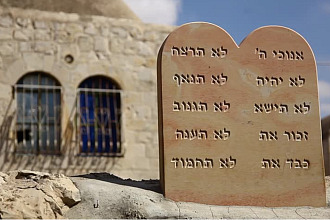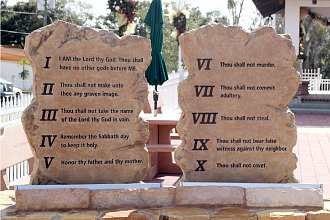Parasha for the Week: Ki Tetzei Deuteronomy 21:10 – 25:19.
Haftara for the Week: Isaiah 54:1 – 10.
Besorat Yeshua: Mark 7:24 - 37
Overview:
The Torah describes the only permissible way a woman captured in battle may be married.
If a man marries two wives, and the less-favored wife bears a firstborn son, his right to inherit a double portion is protected against the father’s desire to favor the child of the favored wife.
The penalty for a rebellious son, who will inevitably become a monstrous criminal, is stoning.
A body must not be left on the gallows overnight.
Lost property must be returned.
Men are forbidden from wearing women’s clothing and vice versa.
A mother bird may not be taken together with her eggs.
A fence must be built around the roof of a house.
It is forbidden to plant a mixture of seeds, to plow with an ox and a donkey together, or to combine wool and linen in a garment.
A four-cornered garment must have twisted threads tzitzit on its corners.
Laws regarding illicit relationships are detailed.
When Israel goes to war, the camp must be governed by rules of spiritual purity.
An escaped slave must not be returned to his master.
Taking interest for lending to a Jew is forbidden.
Bnei Yisrael are not to make vows.
A worker may eat of the fruit he is harvesting.
Divorce and marriage are legislated.
For the first year of marriage, a husband is exempt from the army.
Tools of labor may not be impounded, as this prevents the debtor from earning a living.
The penalty for kidnapping is death.
Removal of the signs of the disease tzara’at is forbidden.
Even for an overdue loan, the creditor must return the collateral daily if the debtor needs it.
Workers’ pay must not be delayed.
The guilty may not be subjugated by punishing an innocent relative.
Because of their vulnerability, converts and orphans have special rights of protection.
The poor are to have a portion of the harvest.
A court may impose lashes.
An ox must not be muzzled while threshing.
It is a mitzvah for a man to marry his brother’s widow if the deceased left no offspring.
Weights and measures must be accurate and used honestly.
Erase the name of Amalek, who, in spite of knowing about the Exodus, ambushed Israel.
"Great Level of Unity"
The name of the Parasha, Ki Tetzei —“when you will go to war” is written in the singular as if the Torah speaks to a single person going to battle. Why does the Torah here use the singular when it takes an army of many divisions and soldiers to fight a war? “Ki Teitzei” in the singular hints to the secret of victory, which can come only when we are “united” as one person.
"74 Mitzvot"
In this Parasha we find more mitzvot (commandments) than in any other portion of the Torah (74 mitzvot). Mitzvot fall into two categories; “bein adam lachaveiro” (mitzvot between one person and another person), and the mitzvot which are “bein adam lamakom” (between us and G-d). Most of the mitzvot in this Parasha concern behavior between people.
“Returning Lost Objects”
One of the mitzvot in this week’s Parasha is the mitzvah of “Hashavat Aveidah” (returning a lost object) to its rightful owner. The Torah states; “You shall not see your brother’s ox or sheep go astray and hide yourself from them. You shall bring them back to your brother. If your brother is not close to you or you don’t know him, then you shall bring it into your own house and it shall be with you until your brother seeks it and you shall give it back to him.” In the Parasha we see a connection between the mitzvot toward each other and toward G-d. Our business dealings with others and our commitment to G-d go hand in hand. One should make Mitzvot their business and their business into a mitzvah! “Hashavat Aveidah”—returning a lost object in its spiritual form refers to “Teshuvah” (repentance). This is especially significant in the month of Elul (the last month of the Jewish year), for Elul is the month of “Teshuvah” in which we must “return” to G-d and ask him to restore us to our original form of holiness and purity. That is the Jewish concept of Justification by faith, G-d has the power to restore us to our original holiness and purity, the one he gave originally to Adam. It is really like if we had never sinned. Praise the L-rd for his kindness for us. If when one’s donkey has gone astray we must help, how much more so must we help when we see a person gone astray spiritually. If a donkey who fell under its heavy load is a mitzvah to help lift, how much more so when a person needs help and a lifting hand physically or spiritually.
“Did You Make a Vow to the Lord?”
“When you shall make a vow unto the L-rd your G-d, you shall not be slack to pay it; For the L-rd your G-d will surely require it of you.” (Deut. 23:22).” For whatever is destined to be given to charity is of no use to try to keep for ourselves.
HAFTARA Isaiah 54:1 – 10
This Shabbat is the fourth Shabbat after Tisha B’Av. We are in a period called Shiva D’nechemta—”Seven weeks of comfort.” The seven Haftarot of the weeks between Tish’a B’av and Rosh Hashana are prophesies of comfort and hope for Israel and God’s people at large.
Haftara: This text is a very special text of comfort since the first verse is not clear for everyone. In this text God is speaking about two wives; the first one is the “desolated” (divorced) wife and the second one is still married. “Sing, O barren one who did not bear; burst into song and shout, you who have not been in labor! For the children of the desolate woman will be more than the children of her that is married, says the LORD” (Is. 54:1). The Brit Hachadasha has clearly identified these two women as Sarah and Hagar. “Now this is an allegory: these women are two covenants. One woman, in fact, is Hagar, from Mount Sinai, . . . But the other woman corresponds to the Jerusalem above; she is free, and she is our mother ” (Gal 4:24, 26). The desolated wife, Hagar, represents Israel and the married wife, Sarah, represents believers. The text then continues to comfort the desolate woman: “Do not fear, for you will not be ashamed; do not be discouraged, for you will not suffer disgrace; for you will forget the shame of your youth… For your Maker is your husband… the Holy One of Israel is your Redeemer… For a brief moment I abandoned you, but with great compassion I will gather you… but with everlasting love I will have compassion on you, says the LORD, your Redeemer ” (Is 54:2-8). G-d continues to love His people, as compared with Hagar, who although Abraham divorced her, he continued to love her. This means that for Israel, God has not cancelled His covenant with His historical people, even though He opened His arms to believers, “My covenant of peace shall not be removed, says the LORD, who has compassion on you. . . . All your children shall be taught by the LORD, and great shall be the prosperity of your children. In righteousness you shall be established” (10-13).
Besorat Yeshua Mark 7:24 – 37
In our Parasha we still have a long list of rules and laws that Moshe gives to Israel as a reminder at the border of the Promised Land. In the Haftara we have great comfort for Israel who has been desolated and divorced but taken back by G-d as her husband.
Besorah: In the text of the besorah we have a complementary text of the Haftara, because the text of the Haftara presents two women, the married and the desolated, but only the desolated is comforted; the married one seems to be ignored. However in the besorah, Yeshua comforts the married woman. In this text of the besorah a Gentile woman is at the center of the story. “…a woman whose little daughter had an unclean spirit immediately heard about him, and she came and bowed down at his feet. Now the woman was of Syrophoenician origin” (Mark 7:25-26). In the text she represents the openness of Yeshua for the Goyim (Gentiles). Yeshua wants to teach his talmidim (disciples) about the needs of these people from the nations who are starving for spiritual food. This lady gave a demonstration of great faith. Yeshua said to her that the words of the L-rd are not for her as she is considered as a dog among the Jewish leaders. “He said to her, ‘Let the children be fed first, for it is not fair to take the children’s food and throw it to the dogs’” (Mark 7:27). With great humility, she accepted her condition. “Sir, even the dogs under the table eat the children’s crumbs” (28). Her faith amazed Yeshua. “For saying that, you may go—the demon has left your daughter” (29). She believed, she went back home, and discovered that her daughter was healed.



